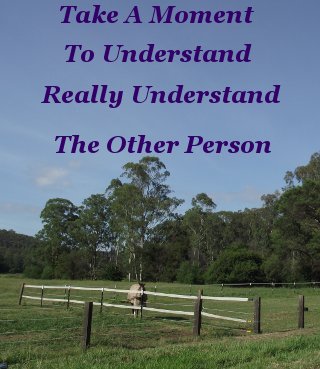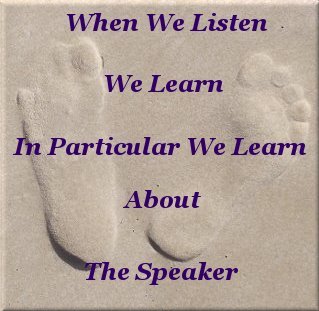Improving Listening Skills
Most Beneficial Commitment
Improving listening skills is possibly the most beneficial commitment one can undertake. The importance of listening can be neither overstated, nor overrated. Everybody profits from an encounter with an excellent listener. An excellent listener though, profits from each and every encounter.

As we well know, verbal interchange is one of the major ways Humans communicate. Yet listening takes a back seat to talking. When listening is inadequate, we suffer the following consequences:
- Relationships deteriorate
- Excellent - or any - ideas are not exchanged and or developed
- Problems are not solved or resolved
- Conflict and it’s chaotic fallout increase in a cascading manner
- Advancement of Human affairs is Thoughtlessly impeded
Thoughtfully developing your listening skills, will, in due course, identify you as a standout. Genuine listening is rare. So few practice it.
When we listen we learn. When we learn, we accrue knowledge. When we accrue knowledge we are in a position to apply that knowledge to action that delivers beneficial outcomes to all involved.
Improving listening skills enables one to see the big picture from a height unattainable in any other way.
Building A Desire To Listen
First and foremost - improving listening skills insists an individual wants to listen. Wanting to listen to another when we believe the subject under discussion is of no interest to us, or we simply do not want to hear the message, is a Desire that largely has to be encouraged by oneself, for oneself.
Building Desire can be demanding, yet once attained, as habit, one’s Mindset is transformed and expanded. One sees situations in a new, clearer, light, recognizing another Human Being who is seeking our attention. To hasten the process of creating, and then maintaining, a desire to listen, a most useful axiom is . . .
Do unto others as you would have others do unto you.
Acting upon this legendary counsel as sound habit, has helped many Thinking Human Beings to avoid unnecessary strife, their whole Life through.
Visualizing yourself as a Self Reliant peacemaker, and can-do problem solver, helps articulate what can be an initially disjointed path. Listening is not always easy, nonetheless, when we do listen, the rewards follow.
The Purpose Of Listening - Rapport
The purpose of listening is to comprehend and understand. Understanding another’s point of view, to their satisfaction, is the prime concern. Whether or not one agrees with the other party is irrelevant at this point.

Ditto for fact or fiction, and right or wrong. At this stage establishing Rapport is all important. Other listening roadblocks can be dealt with, much more readily, and effectively, once rapport is on a firm footing.
Rapport is comprised of:
- Shared trust
- Empathy
- Amicability
- Esprit
Establishment, and maintenance, of Rapport, lays the foundation of a potent Relationship, within which can be found equitable solutions, to any problem. Equitable solutions are the only solutions that can stand the test of time.
If Rapport is limited or nonexistent, so too is Listening.
Attentive Listening Creates Goodwill
Attentive listening fosters Goodwill and leads to the essential rapport that possesses the capacity to alleviate and ameliorate the consequences of past – and present - transgressions. Improving listening skills and contributing to the Joy of the World is the vested right of every man woman and child. As is the manner he or she executes this Fundamental Human Right.
Fundamentals Of Listening
Improving listening skills by learning and applying the fundamentals of listening places one in a position of considerable power - and responsibility. Genuine listeners ask intelligent, relative, questions. Whoever is asking questions is in charge of any interchange between one or more people.
This power is not the viciously abusive practice that has caused the chaotic destruction, and misery, that we are aware of since recorded History. Nor is it the control of our fellows. Control is the sick Desire of the individuals who are the architects of such chaos. Destructive behavior requires no skills.
Types Of Listening
Listening has manifold purposes. The predominant types of listening allow us to fine-tune our response to suit the situation and occasion. Improving listening skills requires one to be not merely cognizant of but familiar with each type, and demonstrate a readiness to adapt to a particular type or combination of types.
Cognizance and readiness to adapt comes with experience. However, prior experience can be gained by:
- Role-playing with others to reach a desirable outcome
- Enacting positive scenarios in one’s mind when alone
- Reenacting an actual scene in one’s imagination
Indeed - reenacting an actual scene in one’s imagination can prove invaluable, providing one is practicing reaching an equitable solution, as opposed to justifying a self serving stance to one’s Conscious Mind.
There Are Three Types Of Listeners:
As with most things in life there are a gazillion ways to do a thing
wrong, and a limited number of ways to do something right. From this perspective, the Art Of Listening suffers the usual malady of
misapprehension.There are three types of Listener.
- People who openly don't listen
- People who pretend to listen
- People who genuinely listen
Listening appears not to possess the status of talking. Relegating the importance of Listening to an inferior position, relative to speaking, tends to propagate and justify misapprehension. Engendering the first two types of listener.
All the same, despite this misapprehension . . .
Genuine listeners stand out – So too do non listeners. Genuine listeners are sought after. Not so non listeners.
Benefits Derived From Improving Listening Skills
For a relationship to work there must be a meeting of participants Minds - this necessarily involves Listening.

Being prepared to truly listen with the intention to understand another, has a salutary effect on one’s psyche.
Others sense this effect and are attracted to it, even though they may be at a loss to identify it.
People, even strangers, will confide in you, and this works towards strengthening Relationships.
A Good Listener does not gossip, or put others down. Or reveal confidences. A Good Listener is a vault of security for all who come into contact with him or her.
The benefits from Improving listening skills and developing the habit of effective listening are manifold. A few more follow:
- We learn much about the speaker and their character
- Our problem solving skills improve – the better we listen the better they become – particularly our conflict resolution skills
- We build stress free relationships
- Listening is the very best way to make friends and allies
- New knowledge and subsequent mind expansion is priceless
Another hallmark of the genuine listener is he or she listens without considering the common attitude of ‘what’s in it for me’. A Disinterested Listener is a welcomed asset to any situation, team, or relationship.
This author has, over extensive time, consistently observed the significant phenomenon that Human Beings who genuinely listen are usually competent at whatever they do. They are not afraid to ask questions, or admit to being wrong, and they don't take offense.
Sincere Humans who consistently focus on improving their listening skills, are strong Humans indeed.
Improving Listening Skills Rocks!
Next - Effective Listening





